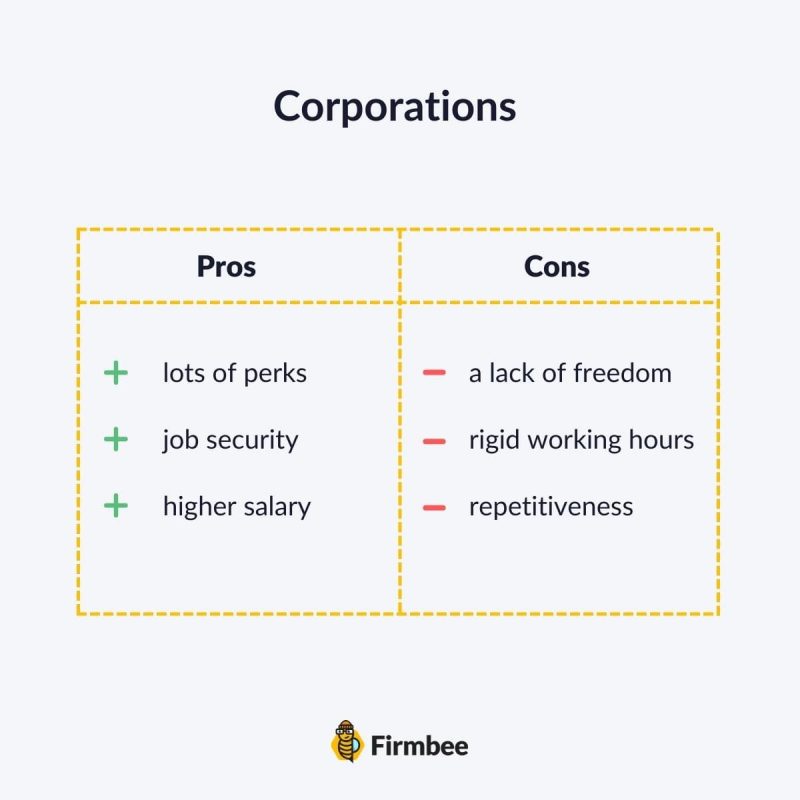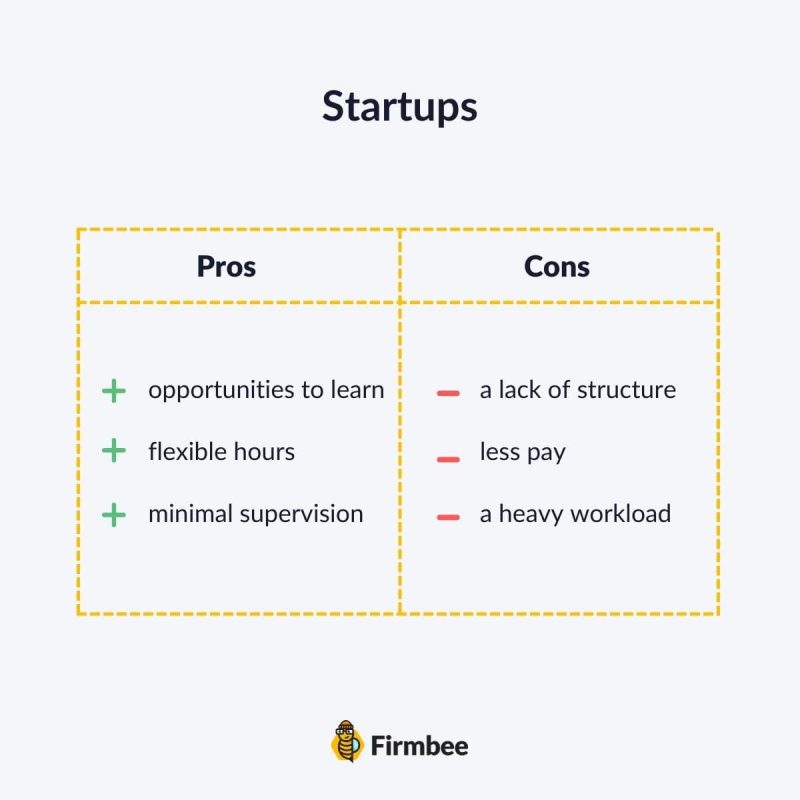Many young people wonder whether it would be better for their career to work for a corporation or a startup. It obviously depends on individual preferences and expectations. However, it’s worth knowing the difference between a startup and a corporate job before making a final employment decision.
Startup vs. corporate job – table of contents:
- What is a corporation? What is a startup?
- Working for a corporation
- Working for a startup
- Startup vs. corporate job – which is better for your career?
- Startup vs. corporate job salaries
- Summary
What is a corporation? What is a startup?
A corporation is a legal entity that is based on capital derived from shares sold in the form of stocks (often listed on the stock exchange). It can be created by a single or several stakeholders who want to achieve a common goal. Every corporation has its own clearly defined organizational structure that usually consists of directors, officers and shareholders. Corporations work on a large scale and hire thousands of employees who frequently build long-term careers there.
A startup, in turn, is actually the opposite of a corporation. It may not even have any formalized structure at the beginning of its activity. Unlike corporations, startups are organizations that focus on rapid growth, flexibility and change.
Working for a corporation
Corporations are usually recognizable brands with an established position in the market. Being associated with such an organization is prestiguous and certainly adds value to your cv. Corporate jobs have clearly outlined roles and responsibilities. Corporate companies have also well-defined processes so that any tasks performed are transparent and uniform.
However, due to their large scale of operation, there may be some problems with the information flow. Corporations are typically risk-averse, so they often hire experts to facilitate the decision-making processes. They offer steady employment, thanks to which employees can feel safe and secure.

Working for a startup
Working for a startup looks totally different. Since startups are usually small businesses which operate in a fast-paced and ever-changing environment, employees need to be flexible and responsible. Their roles and tasks may change overnight. For example, one day you can be concentrated on product development, and the next, you might be on the phone answering the customers’ questions.
At startups, employees are also required to be independent, self-motivated and well-organized as there are no established rules and processes yet. Given a lot of freedom, they may have a great influence on the company’s development. Everyone is expected to pitch in wherever needed.
Startup vs. corporate job – which is better for your career?
It is easy to guess that there is no single answer here. Working for a corporation can be good for those who primarily look for stability and secure employment. Startups, in turn, are perfect for creative and passionate people who are willing to get insight into multiple positions.
Each of these career paths poses various challenges and involves performing different tasks. Not everyone is meant for a job at a startup, and not everyone feels comfortable in a corporate environment.

Startup vs. corporate job salaries
Well, it shouldn’t come as a surprise that corporate companies usually pay their employees more than startups do. Although sucessful young businesses might attract specialists with competetive salaries at later development stages, typical startups don’t stand a chance to do it. According to various payroll reports, startups in the United States pay approximately 5% less than well-established corporations.
This isn’t a particularly bad result since salaries in European startups are lower by about 17%. Most of budding companies aren’t able to pay their employees what they’re actually worth until they grow and increase their revenue significantly. Also, startups often hire young and inexperienced people who still need coaching and mentoring.
Summary
Startups and corporations represent completely different worlds. Both work environments have their benefits, though. While corporate jobs might give you a sense of stability and security, working for a startup can be a valuable experience that will build a foundation for your successful career.
If you like our content, join our busy bees community on Facebook, Twitter, LinkedIn, Instagram, YouTube, Pinterest.
Author: Andy Nichols
A problem solver with 5 different degrees and endless reserves of motivation. This makes him a perfect Business Owner & Manager. When searching for employees and partners, openness and curiosity of the world are qualities he values the most.
Launch your startup:
- What is a startup?
- Pros and cons of creating a startup
- 8 best industries for startups
- Top 5 skills every highly successful startup founder needs
- How to create a startup? 7 simple and easy steps
- 6 essential startup development stages
- How to create a startup growth strategy?
- General startup statistics you need to know
- Startup vs. corporate job. Which is right for you?
- 5 incredible companies that started in a garage
- How to find a business idea?
- How to check if your startup idea already exists?
- How to name a startup? Useful tips and strategies
- How to gain business knowledge quickly? 5 best practices
- Why do startups fail? 6 startup ideas you should avoid
- 5 weird business ideas that made millions
- Top 6 most profitable small businesses
- 7 questions to determine if your business idea is worth pursuing
- What is a buyer persona? 5 benefits of creating a buyer persona
- How to validate your business idea? 3 easy steps
- Should you follow your passion? The importance of passion in business
- What is market reseach and why is it important?
- Using social media in business
- What to do when you have too many business ideas?
- How to write a good problem statement for your startup?
- How to test your business idea for real?
- How to create a prototype for a product?
- How to build an MVP?
- How to use surveys for testing your business idea?
- 10 useful tools to validate your business idea
- What is a business plan? 4 types of business plans
- What should be included in a business plan?
- What should a product description include?
- Competitor analysis
- Marketing strategy
- Traditional business plan vs. lean startup plan
- Implementation plan. What is it and how to create it?
- Everything you need to know about patents
- Financial management for startups
- What permits and licenses does my startup need?
- What is the average startup founder salary?
- 4 startup taxes you need to pay
- Which legal structure is best for your business?
- Startup costs. How much money will you need?
- Protection of intellectual property in a startup
- Family funding vs. self-funding
- What is a shareholders’ agreement?
- What should a financial section of a business plan include?


















